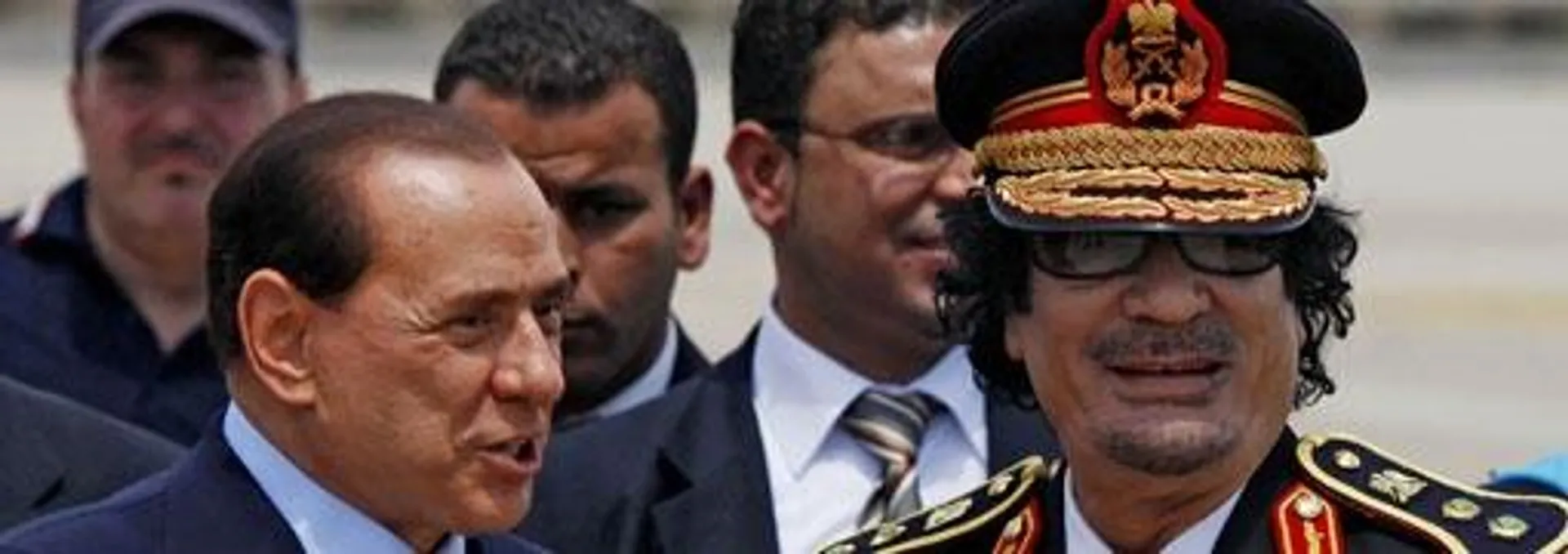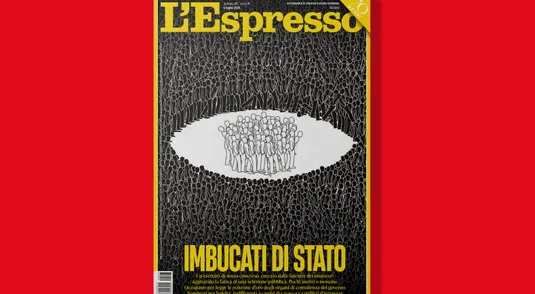Mubarak and Berlusconi are cheerful. After dinner, they chat and laugh about "their meetings with that madcap Qaddafi." Who knows, they may even have talked about "bunga bunga" (think steamy frolics), a phrase invented by the Libyan leader. And there was much good cheer too during a private lunch not so long ago between the Cavaliere (Berlusconi's nickname) and the Tunisian president Ben Alì at the latter's Hollywood-style villa in Carthage. "Old friends, new deals" is how the US ambassador summed it up. But when the subject of the Mediterranean comes up, Italy's foreign policy always goes off on two different paths: Berlusconi deals with the "sexier portfolio", in other words special deals and the like, while foreign minister Frattini handles down-to-earth matters. The US diplomatic documents – obtained from WikiLeaks and published exclusively by "L'Espresso" – show how the regimes of Egypt, Libya and Tunisia were a personal question for Silvio Berlusconi. After all, his style is to embrace the world's dictators, from Putin to Lukashenko, from Chavez to Assad, while ignoring warnings from his ministers and allies. Not to mention the fact that he welcomes the sudden influx of "non- transparent" Libyan capital into the Italian bank Unicredit. With the risk that very private and hastily concocted deals will now carry a high price for the whole of Italy. While North Africa's Maghreb region is undergoing dramatic changes affecting Italy's future – refugees seeking asylum, energy cutbacks and stock exchange tremors – the government seems unable to come up with an appropriate response. And the WikiLeaks cables show how Italy's executive is split from top to bottom – ministers with no compunction about trampling on their colleagues, a marked inability to find a single voice on major problems, bitter feuds amongst party factions, clashes with Bankitalia and with the President of Italy. For months the US ambassador David Thorne has been filing reports to Washington D.C. about the all-out fighting in the government coalition "while waiting to find out who will take over from Berlusconi."
OLD FRIENDS, NEW DEALS
Berlusconi always seems to put his personal affairs before Italy's national interest. The US report on the summit with Ben Alì, Tunisia's dictator before succumbing to wide-scale protests, sums it up with the title "Old friends, new deals." The meeting should have taken place in Berlusconi's Villa Certosa, but was moved to Ben Alì's luxurious residence in Carthage – the very place where the president holed up with his praetorian guards before fleeing abroad. But in August 2009 there were other things on the agenda, with charmer Silvio "telling jokes about Barack Obama and the pope." "The visit was so private that neither of the two foreign ministers was involved or informed about the details." Berlusconi was accompanied by just one person: Tarak Ben Ammar, "business partner and long-standing advisor, nephew of ex-head of state Bourghiba. In 2001 the Italian premier appointed him advisor for North African and Middle Eastern affairs. Apart from his friendship with Ben Alì, Berlusconi's interests in Tunisia include movie studios, distribution companies and a 50% share of Nessma TV split with Tarak Ben Ammar." There's a surreal quality to the official version justifying the summit: "According to local press reports, the two leaders set up a deal whereby electricity produced in Tunisia would be transmitted to Italy via an undersea cable. But in fact, such an agreement had already been signed in July 2003." Totally false, as a cover-up for who knows what hush-hush deals.
IGNORING DEMOCRACY
The cables hardly ever mention disagreement between the premier and his interlocutors, even the most embarrassing ones. "Berlusconi continues to show that he prefers to avoid friction in his relations with foreign leaders, even though this sometimes means overlooking uncomfortable truths." The Americans wonder about his enthusiasm "for very assertive leaders", a euphemism for dictators. Foreign minister Franco Frattini always tries to paint his boss in a good light, by providing "positive" summaries of meetings. When Berlusconi met Hugo Chavez, the Bolivar-like leader of Venezuela, "the premier pointed out the need to respect human and political rights," according to Frattini. But it is clear that the US embassy has little faith in the minister's summaries since he is often excluded from key meetings. The 2004 dossier on Mubarak's visit to Rome explicitly mentions the habit of smoothing sharp edges so as not to offend guests. Between jokes and stories, the premier only mentioned the subject of free elections in passing. "Mubarak was in a skeptical frame of mind, but when he listened to Berlusconi at lunch he began to relax. He said that Egypt, like other Arab countries, finds itself in a difficult situation regarding public opinion. Calling free elections immediately would probably lead to an extremist government." There was no reply from premier Berlusconi. By contrast, when Mubarak said the same thing to Carlo Azeglio Ciampi, the president of Italy replied: "I have always stressed the need for democratic and economic reforms in the countries I have visited, such as Tunisia, Morocco, Algeria."
WE MADE QADDAFI WHAT HE IS Regarding colonel Qadaffi, "Italy and Egypt share the same views. They feel that Libya has made some important steps forward, and that Italy and Egypt deserve credit for having softened Qaddafi." The fact that the colonel's attitude has changed is shown by the cable on Silvio's first visit to Tripoli in 2002, when he was "warmly welcomed." The cable goes on to say that Massimo D'Alema had a rough time in 1999 when he was "forced to spend three hours visiting the national museum while waiting to be received." Berlusconi hoped to settle the claims arising from colonial domination by offering to build a hospital, but the Libyans "surprised him by reiterating their request for a highway worth 60 million euros." However, the atmosphere was friendly enough during two long meetings in the Bedouin tent. But the question of boat people landing on the island of Lampedusa "was only discussed in general terms." Instead "they exchanged significant gifts." Silvio promised "to return the Venus of Cyrene statue," while Qaddafi, provocative as always, "presented him with a rifle dating from the Italian occupation." Tangible results, zero, but deeper mutual friendship and understanding. Berlusconi praised the dictator's "experience" and extolled the "business opportunities" since "Italy depends on Libya for 25% of its energy requirements, rising to 30% from next year." But is it true – asks the ambassador – that "Berlusconi offered to help Qaddafi by putting in a good word for him with the USA?" "Pure invention by the press," snapped the person responsible for the Maghreb at the Italian Foreign Office. Not everyone was taken in by the colonel's new stance. In 2006, the minister of Home Affairs, Giuliano Amato, spoke his mind to senator Allen, governor of Virginia, during a confidential meeting: "We should be wary of trusting Qaddafi; he is a survivor who understands that Islamic terrorism threatens his country too, and that is why he has decided to re-establish links with the international community." The senator replied: "Sure, he saw what happened to Saddam Hussein and when he realized that the Americans had proof of his chemical and nuclear weapon program, he decided to opt out." Amato followed up with: "He's a shrewd opportunist who has no intention of resolving the problem of boat people sailing from Libya; he's aiming for international legitimization by exploiting the situation."
WARM FEELINGS AT THE DACIA
Energy requirements are the official motivation pushing Berlusconi to fraternize with the world's ugliest statesmen. Two documents from 2002 describe the beginning of the friendship between Berlusconi and Putin, when they flew together from the Kremlin to Putin's dacia in Soci on the Black Sea. The feeling between them was obvious and immediate. "Putin telephoned Bush while Silvio was there, asking him to speed up negotiations so that the NATO-Russia treaty could be signed during the Pratica di Mare summit." Giovanni Castellaneta, the premier's influential diplomatic advisor, said: "It was the most important summit of all time." The Americans were amazed and embarrassed by this rapid infatuation. Shortly after his return to Rome, Berlusconi met the ambassador Mel Sembler in public; "he took him to one side and asked him to send a personal request to president Bush." The premier said that Putin needed American help to persuade Russian public opinion that NATO should expand eastwards. He stressed how important it was for Bush to understand Putin's needs on the home front. "Vladimir needs to be seen as part of the NATO family." The aim was to set up a meeting in Rome between the heads of the two superpowers. "But we don't know whether the subject is more interesting to Putin or to Berlusconi." The dacia provided that warm feeling, and since then Russia has joined the "sexier portfolio" with its poolside parties, after-dinner entertainment and dancing. Through ENI (national energy group), Italy became Moscow's fifth column, since Russia uses gas supply as "a weapon to threaten Europe" managing to tap reserves in Algeria and Libya. Under pressure from the United States, some of the ENI managers admitted that relations with Moscow "were dangerous", but no-one was able to dampen the enthusiasm of the two leaders.
Politica
24 febbraio, 2011Old Friend AndNew Deals, Ignoring Democracy
L'E COMMUNITY
Entra nella nostra community Whatsapp
L'edicola
Imbucati di Stato - Cosa c'è nel nuovo numero de L'Espresso
Il settimanale, da venerdì 4 luglio, è disponibile in edicola e in app

